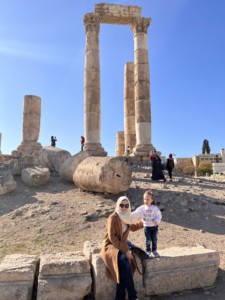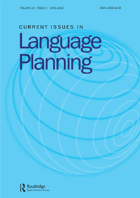Areej Yousef is a Higher Degree Research candidate and research assistant with GIER, in the area of bilingualism and bilingual education, settlement, belonging and identity construction among migrants and refugees.
Recently, she has had her second article from her Master of Education and Professional Studies published.
Entitled, Family language planning strategies among Australian families of Arabic-speaking background, the article discusses the research approach to understanding strategies used by these families to maintain language connections.
On this work, Areej says:
“We found in this study there was a sense of awareness that the parents had to keep the two languages alive. This meant prioritising the use of Arabic at home. Reading to children, meeting up with Arabic speaking to friends, travelling and watching Arabic television shows. There were also deeper spiritual reasons associated with this choice. The family’s connection to Islam, to the Quran, to their family and developing their language as part of their religious identity as well.”
This study focused on transnational families with an Arabic-speaking background in Australia and found that the families were equally motivated to develop their children’s English and maintain their connections to their culture and native language.
Areej says:
“There is this sense of national identity and not being confined to one place. Part of this is a language and cultural decision, not just an economic and strategic decision.”

Citadel Hill of Amman- an archaeological site at the centre of downtown Amman- capital city of Jordan
Areej has a wealth of experience in language teaching and bilingualism. She migrated to Australia from Jordan at a young age and has maintained strong connections with her roots in the Middle East. After completing her undergraduate studies online, Areej went on to complete a Masters of TESOL at Griffith in 2012 and found that she was interested in bilingualism and bilingual development.
Particularly the theories and knowledge about languages when people migrate to places like Australia.
This led to the Master of Education and Professional Studies research project, which culminated in this work and has led on to her PhD pathway program looking at the impact of forced migration on ethnolinguistic identity (re) construction. She is currently exploring the experiences of recently arrived Syrian and Iraqi refugee girls in Australia.
Areej has worked at TAFE with various communities as an ESL teacher, alongside her work as a tutor and researcher at Griffith.
One of her desires in this field is for greater acknowledgement of the wealth of knowledge being brought in. That is, linguistic and cultural knowledge that influences students’ learning.
“We can tap into this as a great source of learning, at a much deeper level, rather than being concerned about people acquiring English in a ‘particular’ way.”
Greater representation and diversification of teaching staff is key to enriching learning experiences and needs of students in Australian schools, which comprise multiple cultures and languages.
On this, Areej says:
“Diversifying teaching staff and having representation, so that more teachers understand the challenges of learning a language and what it means in the brain, might lead to greater empathy for student experiences in this area.”
Areej would like to acknowledge her master’s supervisor, Dr Kerry Taylor-Leech, for her help in producing this publication. Areej is also the HDR Representative for EPS at Mount Gravatt and is keen to support other candidates navigating the publishing maze.
Read more about Areej’s work and research here.


Quadrilingual education in Singapore: pedagogical innovation in language education


